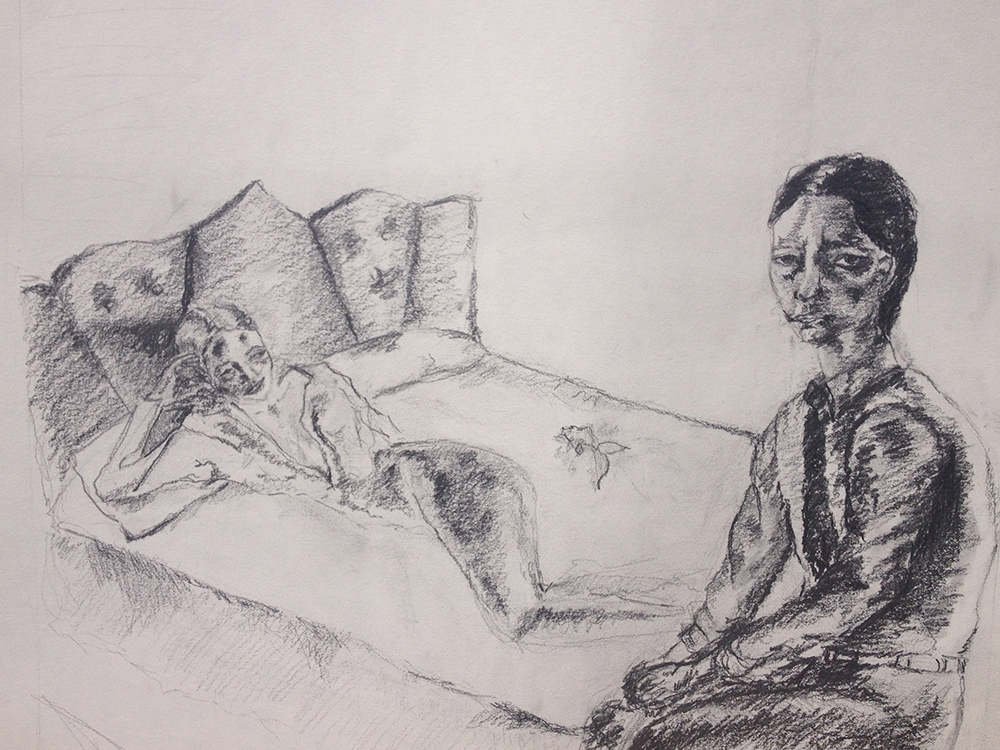Georgia O’Keefe once said of the New Mexico landscape that at first glance it seems as if it has already been painted for you. But that was before, she says, she attempted to paint it. And so it is, that after many attempts to record this story, I find myself writing it, three years later.
This is the story: every day after work, Professor Asher leaves campus by the back road. The road is narrow, winding, and thickly forested. After a few minutes of driving he arrives at a T in the road. Because the road he meets is likewise winding and forested he can only see a car coming around either bend for about three seconds before it passes in front of him. Each day he comes to the stop sign, and without a car in sight, he waits. As if waiting for a car to come. That is the whole story.
When I first heard this story I was deeply excited by the idea of that strange and profound moment of waiting. I spent a long time trying to find a parallel story in my own life. I could not find the answers to the questions it posed. What does it mean to wait, to take a posture of waiting? What are we doing when we wait for something that is by its very nature unexpected?
Every day on the bench outside the coffee shop where I work, an oscillating dozen wait, watching cars come and go. Together they greet, they bicker, they comfort, they forget, they interrupt and distract one another. And as they wait for all these things, I wait upon them. Often they stay too long, and with a defiant sigh they unfurl in a stretch, cast off their empty cups and flap away dazed and perhaps a little melancholic…. I love them and I think they are brave and also sweet.
Not everyone feels this way. Often times certain customers express to me a desire to hold those birds on a wire accountable for their “idleness.” Not surprisingly, these vigilante arbiters never want to know what they talk of, what they are doing there. What they really want to hear is what they think they already know; what the birds aren’t doing, what they are neglecting to do.
To them, stories about waiting are always cover stories. Cover stories for avoidance, fear, and the worst and most banal parts of human existence. They might say the professor waits at the stop sign to avoid an unbearable home life, or because he fears a fantastic crash. Here is a secret I will only say once. Those people may not be wrong. But they are no friend to the lost or the waiting. And their miserly hearts are thinly veiled in an unimaginative ambition. Let us choose not to deal in such heavy-handed accuracies. Tonight, every night, let us tell a lie we prefer to the truth.
To notice our waiting is to touch the air we live in. Its closeness, not its strangeness conceals it. One of the most striking ways we wait is the way we wait on desire. When we wait with desire we imagine the object of that desire. But first we wait for the desire to locate such an object. Just like before we look for someone to talk to, we wait for the desire to speak. When we fall in love—or don’t—we make a choice between desiring and waiting.
I love the car allegory because it transforms the white noise of waiting into a moment of breathless excitement, followed by the sudden vertigo of freedom. It’s how I feel when I stand on the mesa. It’s how I’ve felt at every moment of my life that’s ever made me happy. In the two years since I graduated college I have come to believe in this opaque allegory. I believe that it holds the secret to navigating my post grad life. In staying with the story, I mirror it. I too am waiting for an unforeseeable burst of knowledge that will, more than anything, prevent me from the clear and uninspired path ahead.
Waiting to discover that things are not as they are, that things are unforeseeably different, has its dangers, of course. Boredom, depression, loneliness. These are the woods of waiting, dark and deep. When we are lost in them, their impression of permanence is profound. If waiting is the way in which we choose to be lost, then these woods are the ways of being lost that we cannot imagine how to unchoose.
Truth be told, in all my waiting I have spent more time in the woods than out. I have followed maps to nowhere. And waited for things that never came, or that came but left. Waiting, it turns out, depends less on our patience than it does on our relationship to reality. Those who wait have a quarrel with the world.
Suffocating in the opposite of distraction, I watch lunatics and obsessives waltz by and I envy their direction, their sense of the coordinates. Whether in the woods or on the mesa, I want to believe that the things I wait for wait for me just as much.
I’m still in Taos. If you see me at a stop sign, I’ll be waiting. Or, you may see me on the road tonight, driving fast.

